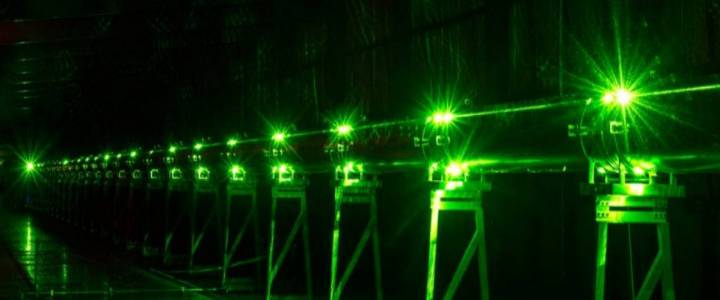
About Research
The New Mexico Tech Physics Department comprises scientists in two main disciplines: astrophysics and atmospheric physics. Students have a wide range of research opportunities in both of these areas.
Astrophysics
Astrophysics research at New Mexico Tech encompasses planetary, stellar and galactic specializations. Student have access to state-of-the art observatories around the world, as well as several local facilities. The Very Large Array (VLA) is adjacent to New Mexico Tech's campus and an optical interferometer with novel capabilities for exoplanet research (the Magdalena Ridge Observatory Interferometer) is under construction on a nearby mountaintop. In addition, the Etscorn Campus Observatory is a student-operated facility with both optical and radio telescopes for independent use by all students.
The Planetary Astronomy Group within the department is a diverse group of faculty and students studying the physical processes in gas-giant planets. Faculty members use ground observation, space-based observations and numerical models to obtain information about these systems.
Astrophysicists at New Mexico Tech also study stellar and galaxy evolution using x-ray, optical, infrared and radio telescopes. There is also extensive work on the interstellar medium (ISM) and chemistry of the ISM.
In sum the astrophysics group is a thriving, multiwavelength, observational research program examining the engines that drive the internal structure and evolution of galaxies.
Atmospheric Physics
Atmospheric physics applies the tools of physics (thermodynamics, electromagnetism, fluid mechanics, etc.) to Earth’s atmosphere and atmospheric phenomena.
At New Mexico Tech, atmospheric physicists primarily conduct research in the following areas:
- Lightning and atmospheric electricity (including plasma physics)
- Chemistry of the middle and upper atmosphere (including ozone and space weather)
- Climate, convection and atmospheric dynamics (on Earth and other planets)
As with the astronomers, atmospheric physicists and students at Tech have access to world-class and unique instrumentation. We use facilities such as the Gulfstream G5 provided by the National Center for Atmospheric Research (NCAR) in Boulder, as well as supercomputer facilities. Locally, we have the Langmuir Laboratory for Atmospheric Physics, a facility unique in the world, providing an instrumented mountaintop specialized in lightning research. Langmuir also includes balloon-launch facilities and a capability in compact instrumentation appropriate for remote and airborne deployments.
Student Research
An important mission of university research programs is the training of students in research techniques as part of their educational experience. Many will use the tools and techniques learned in the lab throughout their careers. The New Mexico Tech Physics Department has students involved in research at all levels, from undergraduate laboratory assistants to graduate Ph.D. research. Moreover, students make essential contributions to most research done at New Mexico Tech.